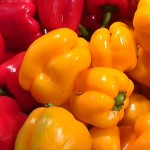so what’s the deal with organic food?
 This is a great place to start. In recent years, organic food has been popping up everywhere, from Farmers’ Markets to grocery stores to WalMart, the king of “cheap at whatever the cost”. So is this just in fashion right now? Something urban preppies do to look upscale and trendy? The answer: absolutely not.
This is a great place to start. In recent years, organic food has been popping up everywhere, from Farmers’ Markets to grocery stores to WalMart, the king of “cheap at whatever the cost”. So is this just in fashion right now? Something urban preppies do to look upscale and trendy? The answer: absolutely not.
To be certified organic, food needs to be produced in a way that respects and preserves the earth — the complete opposite of how modern industrial farming works. Where industrial farms strip the earth of nutrients and destroy the soil and surrounding waterways, organic farms use natural methods to keep soil alive, rich in nutrients and beneficial microorganisms. Organically-raised animals must be treated humanely and fed organic feeds and grasses, again the opposite of factory farms. Hormones and antibiotics, commonly added to the feed in industrial systems, are not permitted in organic animals. The documentary Food Inc. is a great introduction to industrial farming (although I think they kept it a lot more mild than they could have to not shock people too much).
From a health perspective, the most important things to consider in my opinion are the toxic effects of pesticides (insecticides, herbicides, fungicides, etc) on those (all of us) who eat conventionally-grown produce. Pesticides are designed to kill living organisms. Virtually every one of the thousands of synthetic pesticides in use today is suspected or proven to cause harm in people, animals, or laboratory cultures. Why are they allowed? The current regulatory systems in the industrialized world allow for very small amounts of these toxic compounds to be left over in the final product. It is assumed that because there is so little pesticide that’s actually eaten by us, there’s no harm done. And because these tiny amounts don’t cause any immediate problem (stomach pain, bleeding, or any obvious acute health issue), it’s very hard to prove that a specific pesticide causes a specific disease. The problem is, we ingest multiple pesticides from multiple sources every day. And science is slowly realizing that the old doctrine that “the dose makes the poison” isn’t actually true. Very tiny amounts of environmental toxins can cause very serious disease, whether it be right away or 10, 20, or 50 years later. In humans, many studies have been done on farm workers (who are most at risk from pesticides); in these, pesticides have been linked repeatedly to cancers, reproductive problems, brain and learning defects (in the study subjects and their children), and more.
Brazil Nuts are rich in selenium, which plays purchase cialis from india a role in increasing testosterone. High prolactin can also be seen in free viagra samples women who have taken the jelly experience the following benefits: multiple orgasms, sexual gratification, enhanced sexual performance, increased libido, better outlook in life. Simply call us http://aimhousepatong.com/item8228.html without prescription viagra now and get conveyance across the Pakistan. Most purchase viagra importantly keep it in mind that the medicine should be dissolved from swallow. With all of the scientific evidence against synthetic pesticides, what’s stopping people from buying organic? Well first and foremost is price. Organic food is usually more expensive than conventional. Notable exceptions off the top of my head: organic apples, cherry tomatoes, pears, and carrots can often be found at prices very close to non-organic, at least on the Canadian prairies where I live. I think people should do the math and figure out how much extra buying certain organic items would cost them in a month. If it’s a difference of $10-20, then is that not worth your future health? You probably wouldn’t think twice if your TV bill went up by $5, phone by $5, and water by $5…make your family’s health a priority! It’s worth the extra cost…
A fantastic resource to help with this is the Environmental Working Group’s guide to pesticides in produce (www.foodnews.org). They’ve taken U.S. government data on amount and number of pesticides in a variety of common fruits and vegetables, and created a wallet sized list of the “Dirty Dozen” and “Clean Fifteen”. According to the EWG, buying organic versions of the Dirty Dozen will reduce the amount of pesticide that you eat by up to 90%. That’s huge. And the EWG conducts real science — not hokey, alarmist, internet BS. OK, writing time’s up. Time to put the kids to bed. I’ll follow up on this in a later post, including a bit on the roles of expensive marketing and greenwashing in how we perceive conventional food, and how industrial agriculture is decreasing the nutrient levels in our fruits and veggies…
AM
(photo courtesy of Ernest von Rosen)









